In the past, the sight of a facemask on the train conjured up memories of SARS. It was always tempting to tell the wearer that it wasn’t 2004 anymore.
But two experts warn TV2 we had better get used to them, as they’re here to stay!
Likely to be around until July and beyond
Professor Jan Pravsgaard Christensen, an expert on immunology at the University of Copenhagen, predicts that facemasks will need to be worn in many areas of Danish society until the very last person has been vaccinated in late July – and possibly even beyond.
For example, they are likely to be required when standing in restaurants (and bars when they reopen) long after everyone over the age of 50 has been jabbed – the cut-off point identified by PM Mette Frederiksen as when society can return to normal.
After all, it has already been proven that vaccinated people can infect those who haven’t received it yet, adds Christensen.
Threat of new mutations
“If the infection is low this summer, wearing a facemask will probably also go from being a formal requirement to a recommendation in supermarkets and public transport,” predicted Christensen to TV2.
However, he envisages them being reintroduced in the autumn as a precaution.
“It is better to be at the forefront, and we must avoid a flare-up at all costs of, for example, new infectious mutations, which the vaccines are not as effective against.”
According to Christensen, South African has already dropped AstraZeneca because it has little effect on the country’s variant.
Becoming the norm for other situations
Niels Høiby, a professor of clinical microbiology at Rigshospitalet, concurs that a new mutation may change the playing field and see facemasks reintroduced again.
In the meantime, he predicts we will start wearing them for other reasons: for example, during flu epidemics or due to bad air pollution.
“Now that the facemasks are established here, I think we will see that you put them on if, for example, we get a flu epidemic. Whether you also want to put them on in Denmark, for minor symptoms and colds, for example, I doubt,” he told TV2.
“Nothing shakes up our habits more than a crisis. In future, the next time we see an Asian wearing a facemask on the train, we’ll most likely think they’re not so crazy.”














